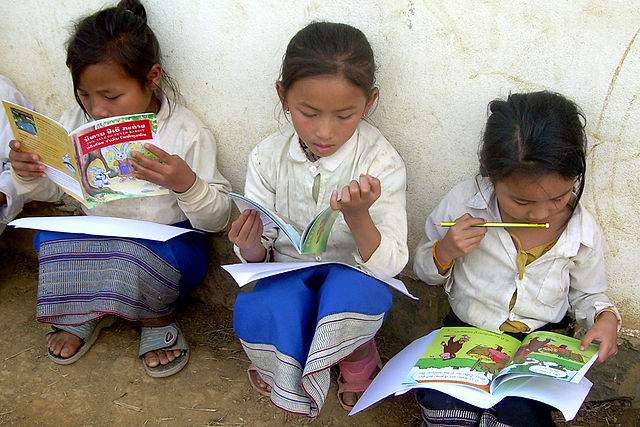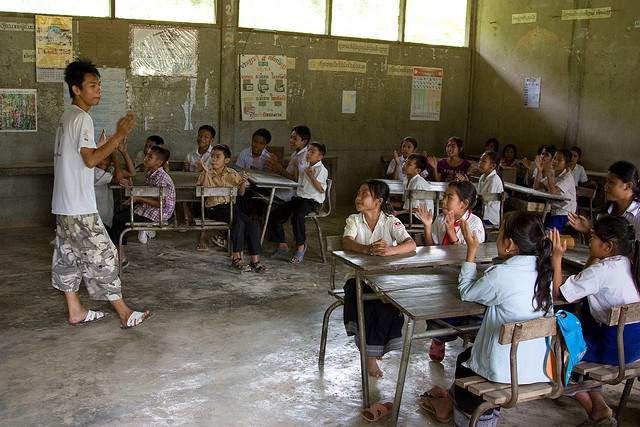As Americans (or citizens of any western society), we take many things for granted. Despite always having our basic needs met, we sometimes complain about not having enough of this or that, and the this or that is usually a luxury that certainly isn’t necessary just to live. These luxuries just make our lives easier, better, and more enjoyable. Everyone likes nice things, and that’s all right. I don’t think we need to feel guilty about it. We’ve worked hard to be able to spend our money how we choose.
We also sometimes forget just how lucky we are. There are many people around the world who work just as hard (and many times much, much harder) than we do, yet still barely have enough to put roofs over their heads and food in their mouths. Sure, we may read about poverty both at home and around the world; we may see pictures in magazines and newspapers and stories on the news, and it‘s certainly something that can have an impact on us.
It’s quite another thing to not only see it in person, but to speak to people who struggle on a daily basis.

While my wife and I were in Luang Prabang during our RTW, we volunteered at an organization called Big Brother Mouse. This Lao organization has been around for a few years, and its main goal is to provide books in Lao for children in rural villages. Because of the vast poverty in Laos, the illiteracy rate is quite high. Education is hard to come by, and tools to educate even harder. Many children in rural Lao villages have never even seen a book.
Can you even imagine?
Education is hard to come by, and tools to educate even harder. Many children in rural Lao villages have never even seen a book. Can you even imagine?
Big Brother Mouse has been working, albeit slowly, to change this unfortunate fact of life for small children. But they need help. There just aren’t many books published in Lao, and simply translating and republishing already existing books isn’t as simple as it sounds. To try to put it into some perspective, the middle class in Laos earns about $100US a month, and over 75% of the people live on LESS than 2 US dollars a day. That’s right, TWO.

In order to better their lives and make any headway in getting out of this poverty-stricken cycle, it’s imperative to learn English. Children who are fortunate enough to even go to school then try to find a way to come up with the money to take English classes on the side. Big Brother Mouse tries to help these eager-to-learn students. From nine until eleven every morning, they invite any Lao student and any English speaking tourist to their office in Luang Prabang to practice English.
To try to put it into some perspective, the middle class in Laos earns about $100US a month, and over 75% of the people live on LESS than 2 US dollars a day.
We showed up to this “lesson” for the first time not quite sure what to expect. We walked into the office and were met with emphatic “Sabaidee’s” (Hello) from about ten different students sitting around a table talking to a British traveler. We were the second and third people to show up to help that day, and several of the Lao students quickly jumped up, snatched chairs and glasses of water, and invited us to sit down with them.
They sat around and started asking questions, thinking hard about what they were saying and how they were saying it. Many of these students were in college, most studying to teach English. Most had only started learning English themselves within the last two or three years. We were both thoroughly impressed at their depth of knowledge of the language despite the short time studying it.
Unfortunately they know the importance of learning English, and despite being able to carry a conversation and being nearly fluent, if not perfect, many of the students didn’t think they were good enough. Their teachers in college push hard for them to be perfect, even though that’s not realistic given the time they’ve had to learn a language completely different from their own. If they couldn’t think of a word or didn’t quite understand what we were staying, they would get frustrated and apologize for their terrible English. We did everything we could to encourage them and tell them how good it really was.

Seeing kids beat themselves up over not getting something is never an easy thing to see, but it was even tougher when we really saw a glimpse into some of their lives.
My wife talked to a young man who was from a little village in the northern part of Laos. His family was very poor, but they wanted him to move to Luang Prabang to go to school to better his life. This meant rarely seeing his parents and younger siblings since it was very expensive to travel back to see them. It also meant that he had to work to be able to even pay for school and his very meager living expenses. So he went to school five days a week, worked six days a week, and voluntarily came to Big Brother Mouse six days a week to improve his English. And he did all this with a huge smile on his face and was very thankful for our participation and help.
I met a young man that same day who also came from a small village and a very poor family. He was in his first year of school and was studying to become an architect.
Then he told me something I will never forget. Something that just broke my heart and really put things into perspective.
He said that he wasn’t sure that he’d be able to continue studying architecture because he needed pencils to draw, pencils in Laos were very expensive, and he wasn’t sure that he’d be able to afford to keep buying them.
PENCILS!!!
Can you even imagine not being able to continue your education because you can’t afford to buy pencils? It is impossible for me to even wrap my head around that idea, especially as a former teacher in a private, affluent, suburban high school, where any resource I needed was at my disposable (hell, every student had a freaking laptop where I taught).
It made my heart melt, and the fact that a nineteen-year-old man can be so excited about receiving a pencil really made me appreciate everything that I am so lucky to have.
At the end of the first lesson, the young men thanked us emphatically and told us that they hoped we would come back again if we could. They were so sweet and very appreciative of our help (not quite the same reaction I got from my students back home).
We walked outside, and I went up to the boy I spent the most time talking to (the architecture student). I reached into my bag and pulled out a pencil and gave it to him. He had a look of shock on his face and said that it wasn’t his. I told him that it was mine but that I wanted him to have it. The smile and excitement on his face was worth more than I can ever portray in words. He thanked me over and over again. It made my heart melt, and the fact that a nineteen-year-old man can be so excited about receiving a pencil really made me appreciate everything that I am so lucky to have.
We went back to Big Brother Mouse a few more times during our stay in Luang Prabang, and it was honestly one of the best experiences of our entire trip. Please feel free to check their website out; it‘s a fantastic organization that is doing wonderful things to help children of poor villages and these very eager Lao students better their lives.
Read more about volunteering and the impact it can have on a person:
- Getting Your Boots Dirty: How Volunteering in Africa Changed Me
- How to Get Started with Voluntourism
- Volunteering in Rural India
- How to Add Volunteering to Your RTW Trip
Photo credits: Blue Plover, Mr ATM, Adam Seper
